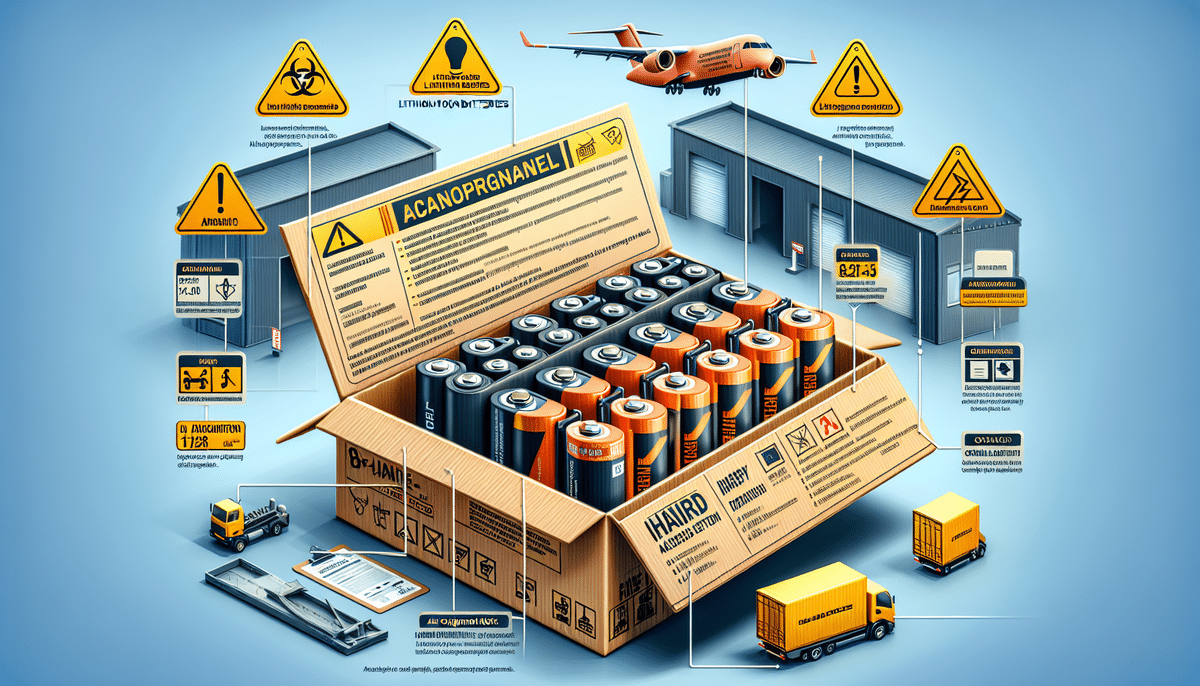FedEx Releases Updated Guidelines for Shipping Lithium Batteries
FedEx has recently released comprehensive and updated guidelines for shipping lithium batteries, aimed at ensuring the safety of both the batteries and the individuals involved in their transportation. Lithium batteries are integral to a myriad of products, ranging from smartphones and laptops to electric vehicles, making their efficient and safe transport essential for global commerce and personal use. However, improper handling of these batteries can pose significant risks, prompting FedEx to proactively provide these detailed guidelines to its customers.
Understanding Lithium Batteries and Their Risks
Lithium batteries are rechargeable power sources commonly used in electronic devices and transportation equipment due to their ability to store a substantial amount of energy in a compact and lightweight form. According to the International Energy Agency (IEA), the demand for lithium batteries has surged by over 15% annually in the past five years, driven by the rise of portable electronics and electric vehicles.
Despite their advantages, lithium batteries can be hazardous if mishandled. They are prone to overheating, explosion, or fire if damaged, short-circuited, or improperly shipped. Specifically:
- Thermal Runaway: A condition where the battery overheats, potentially leading to fires or explosions.
- Chemical Reactions: Exposure to air and water can cause lithium to react violently, resulting in hazardous conditions.
- Environmental Impact: Improper disposal can lead to toxic chemicals leaching into soil and water sources.
Given these risks, it's crucial to adhere to safety protocols when handling and transporting lithium batteries.
Why Proper Packaging is Crucial When Shipping Lithium Batteries
Proper packaging is vital to prevent accidental damage to lithium batteries during transportation. FedEx's guidelines emphasize selecting packaging materials that are robust and resilient enough to shield the batteries from impacts, drops, and compression. Specific requirements include:
- Packaging Materials: Use of strong, non-reactive materials that can absorb shocks.
- Size and Weight: Ensuring packages meet FedEx's dimensional and weight specifications to avoid mishandling.
- Labeling: Clear labeling with "Lithium Ion Battery" labels, appropriate UN numbers, and shipping names as per ICAO regulations.
Proper packaging not only prevents damage but also ensures compliance with international safety regulations set by organizations such as the International Air Transport Association (IATA) and the International Civil Aviation Organization (ICAO). Non-compliance can result in fines, shipping delays, and heightened safety risks.
FedEx's Newly Updated Guidelines for Shipping Lithium Batteries
The latest FedEx guidelines for shipping lithium batteries align with the most recent industry standards and regulations. These guidelines cater to both domestic and international shipments, ensuring adherence to IATA regulations.
The updated guidelines cover all types of lithium batteries, including lithium-ion and lithium-metal batteries used in various electronic devices. Key aspects include:
- Packaging Specifications: Detailed instructions on packaging materials and methods.
- Labeling Requirements: Mandatory labels and markings for hazardous materials.
- Documentation: Necessary shipping documents to accompany the package.
Failure to comply with these guidelines can lead to severe penalties and increase the risk of accidents during transit. FedEx advises all shippers to thoroughly review and adhere to these guidelines to ensure safe and compliant transportation of lithium batteries.
What You Need to Know Before Shipping Lithium Batteries with FedEx
Shipping lithium batteries with FedEx involves understanding and adhering to several key requirements:
- Proper Packaging: Use of recommended materials and methods to safeguard batteries.
- Risk Awareness: Understanding the potential hazards associated with lithium batteries.
- Documentation and Labeling: Accurate and comprehensive paperwork and labels to meet regulatory standards.
Additionally, it's essential to recognize the differences between lithium-ion and lithium-metal batteries, as each type has specific shipping regulations.
Staying informed about regulatory changes is crucial, as shipping laws can vary by country and evolve over time. Regularly consulting authoritative sources like FedEx’s official guidelines and regulatory bodies ensures ongoing compliance and safety.
The Importance of Compliance with Lithium Battery Shipping Regulations
Adhering to lithium battery shipping regulations is imperative to avoid legal repercussions, including fines, sanctions, and potential criminal charges. Compliance ensures batteries are transported safely, minimizing risks to public safety and the environment.
For businesses, compliance is not just a legal obligation but also a factor that affects operational efficiency and reputation. Non-compliance can lead to shipping delays, financial losses, and damage to a company's credibility. Conversely, maintaining strict adherence to regulations fosters trust and reliability in the marketplace.
Given that regulations are continually updated in response to technological advancements and safety research, businesses must proactively stay informed to remain compliant and uphold safety standards.
How to Avoid Common Mistakes When Shipping Lithium Batteries
FedEx's guidelines highlight several common pitfalls to avoid when shipping lithium batteries:
- Incorrect Documentation: Ensure all necessary paperwork is accurately completed and accompanies the shipment.
- Improper Packaging: Use the appropriate materials and techniques to prevent damage.
- Lack of Proper Training: Staff involved in shipping should be adequately trained on handling lithium batteries.
One prevalent mistake is the failure to properly label packages containing lithium batteries, leading to potential shipment rejection or delays. Additionally, not verifying the destination country's specific regulations can result in non-compliance and associated penalties.
FedEx offers training services to help shippers understand and implement best practices for safe lithium battery transportation.
The Impact of Lithium Battery Safety on the Transportation Industry
Lithium battery safety is a critical concern within the transportation industry, directly impacting economic activities and public safety. Incidents involving lithium batteries, such as fires and explosions during transit, have heightened regulatory scrutiny and prompted stricter safety measures.
One major challenge is mitigating the risk of thermal runaway, where overheating can lead to catastrophic failures. To address this, transportation companies are investing in advanced technologies and materials, such as:
- Thermal Barriers: Insulating materials that prevent heat transfer.
- Fire-Resistant Packaging: Specialized containers that contain potential fires.
- Improved Battery Chemistries: Research into safer lithium battery formulations less susceptible to thermal runaway.
Continuous advancements in these areas are essential to enhance the safety protocols surrounding lithium battery transportation.
FedEx's Commitment to Safety and Compliance When Shipping Lithium Batteries
FedEx demonstrates a steadfast commitment to the safe and compliant transport of lithium batteries through several initiatives:
- Comprehensive Guidelines: Detailed instructions that align with the latest safety standards.
- Training Services: Educational programs for shippers, consignees, and carriers to ensure informed handling.
- Advanced Technology: Utilization of specialized packaging and labeling technologies to enhance shipment safety.
- Regulatory Collaboration: Ongoing cooperation with regulatory bodies to stay ahead of compliance requirements.
These measures collectively ensure that FedEx remains a reliable partner in the secure transportation of lithium batteries, prioritizing safety and regulatory adherence.
Expert Tips for Properly Packing and Labeling Lithium Batteries When Shipping with FedEx
Experts advise shippers to implement the following best practices when packing and labeling lithium batteries for FedEx shipments:
- Use Sturdy Packaging: Select packaging specifically designed for lithium batteries to prevent damage.
- Clear Labeling: Ensure packages are clearly marked with "Lithium Batteries" and relevant hazard labels.
- Full Charge: Ship batteries fully charged to reduce the risk of damage during transit.
- Avoid Mixing with Hazardous Items: Do not pack lithium batteries with sharp objects or items that generate strong magnetic fields.
- Include Detailed Documentation: Provide packing slips or invoices detailing the type and quantity of batteries.
Additionally, staying updated with the latest FedEx guidelines and international regulations is crucial for maintaining compliance and ensuring the safe delivery of lithium batteries.
The Future of Lithium Battery Transportation and Regulations
The transportation and regulation of lithium batteries are dynamic fields, continually evolving in response to technological advancements and safety research. Industry experts anticipate ongoing updates to regulations to enhance safety measures and accommodate the growing demand for lithium-powered devices.
FedEx's evolving guidelines reflect a commitment to addressing these challenges by integrating the latest safety standards and adapting to regulatory changes. Future developments may include:
- Enhanced Safety Technologies: Implementation of cutting-edge materials and monitoring systems.
- Stricter International Standards: Harmonization of global shipping regulations to streamline compliance.
- Innovative Packaging Solutions: Development of smarter packaging that can adapt to various shipping conditions and battery types.
As the reliance on lithium batteries intensifies, maintaining robust safety and regulatory frameworks will be paramount to ensuring secure and efficient transportation within the industry.






















